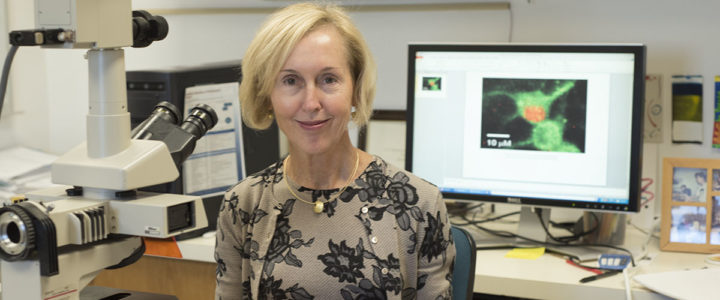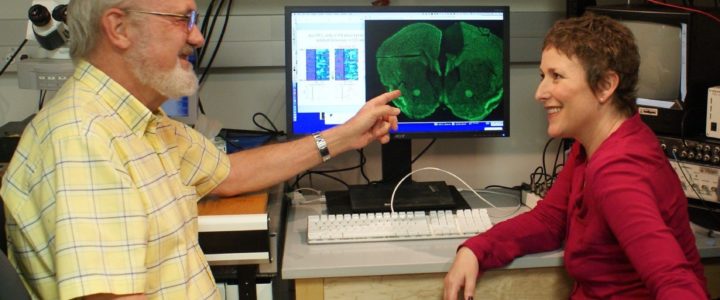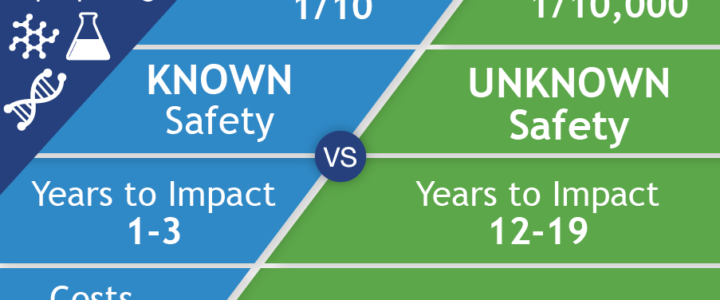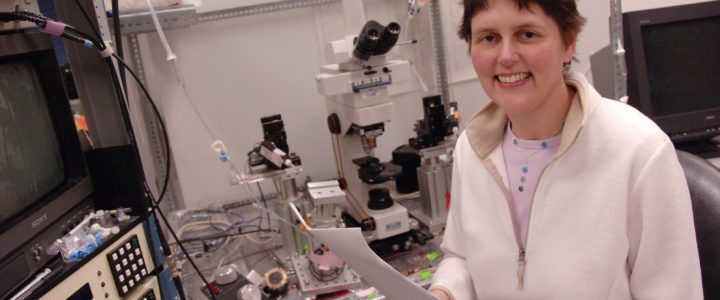Peter Todd, MD, PhD, Assistant Professor in the Department of Neurology in the University of Michigan Medical School, was awarded a FRAXA Research Grant for gene reactivation with the use of CRISPR. In this interview he tells us about CRISPR in Fragile X research, how realistic is it that it could turn the Fragile X gene back on, and if it can really cure Fragile X.
Read moreNIH
Tetra Discovery Partners Initiates Phase 2 Trial of BPN14770 in Fragile X Syndrome

This 2-Period Crossover Study of BPN14770 is accepting adults males with Fragile X syndrome at Rush University Medical Center in Chicago. Principal Investigator of the study is Elizabeth Berry-Kravis, MD, PhD.
A selective inhibitor of the phosphodiesterase type-4D (PDE4D), BPN14770 has shown the ability to improve the quality of connections between neurons and to improve multiple behavioral outcomes in the Fragile X mouse model.
Aripiprazole as a Treatment for Fragile X Syndrome

Many medications are used to help people with Fragile X cope. But few clinical trials have been done on these drugs. Years ago FRAXA funded Dr. Craig Erickson to run a trial of aripiprazole (aka Abilify). FRAXA guest writer Hannah Miles recently caught up with Dr. Erickson to learn the results of the trial.
Read moreStudy Examines Behavioral Traits of Fragile X Patients Without Autism

Patients with Fragile X syndrome who don’t meet the cut-off for a diagnosis of autism show a decrease in impulsivity and repetitive questioning over time, when compared with patients who do, a new study shows.
Read moreTakeaways from Fragile X Advocacy Day

In the first week of March I attended my first Fragile X Advocacy Day to meet with many of the Massachusetts delegation to Congress. While this was my first time advocating for Fragile X research, I’ve been a longtime lung cancer research advocate and have met with many of the same representatives in the past. It was a pleasure to meet with many of the families as my participation in Advocacy Day was in the spirit of “we are all in this together”.
Read moreImpact of the Fragile X Community

At FRAXA Research Foundation, we are truly grateful for our Fragile X community and thousands of donors. We couldn’t keep moving the ball forward in research without your support. Each year FRAXA invests over $1 million in Fragile X research thanks to your support. Because we supported these three researchers, we were able to secure another $35 million in research aimed at identifying clinical trial outcome measures that will lead to human trials of promising treatments for those affected by Fragile X.
Read moreFragile X Clinical Trial of AZD7325 in Adults

With a $51,000 grant from FRAXA Research Foundation, Dr. Craig Erickson conducting a double-blind, placebo-controlled clinical trial of AZD7325 in adults ages 18-50 with Fragile X syndrome at Cincinnati Children’s Hospital. The compound being studied is an investigational new drug from AstraZeneca that targets GABA (A) receptors.
Read moreCRISPR Reactivation of the Fragile X Gene

“We are trying to target the first event that goes wrong in Fragile X syndrome”, says Todd, “One reason our previous attempts to develop treatments for Fragile X syndrome have failed is that they’ve tried to target the downstream effects of losing the Fragile X protein. The protein does many things… bypassing all the functions that it normally takes care of has proven difficult from a pharmacologic perspective.”
Read moreIn Their Own Words: Reports From the International Fragile X Workshop

The 18th International Fragile X and Related Neurodevelopmental Disorders Workshop in Quebec, Canada, was a great success, featuring Fragile X much more heavily than any previous meeting in this series! We asked our speakers to summarize their work in their own words, with brief updates from researchers investigating Fragile X.
Read moreAutophagy is a Novel Therapeutic Target of Impaired Cognition in Fragile X Syndrome

Dr. Suzanne Zukin, at Albert Einstein College of Medicine, is expert on signaling pathways in the brain and the regulation of synaptic plasticity. With this 2017 grant of $90,000 from FRAXA Research Foundation, she and her team are exploring autophagy, which is how cells clean house, in Fragile X.
Read moreTargeted Transcriptional Reactivation of FMR1 in Fragile X Syndrome Stem Cells

With a $90,000 grant from FRAXA Research Foundation awarded in 2016, University of Michigan researcher Peter Todd, MD, PhD, is using CRISPR to selectively turn the Fragile X gene back on in stem cells.
Read moreDefining Subcellular Specificity of Metabotropic Glutamate Receptor (mGluR5) Antagonists

With $217,500 in grants from FRAXA Research Foundation, Dr. Karen O’Malley and team studied the function of mGluR5 when it is inside cells. Many of the symptoms of Fragile X Syndrome (FXS) are thought to arise due to overactive metabotropic glutamate receptor 5 (mGluR5) signaling, which is normally opposed by the protein missing in FXS, Fragile X Protein (FMRP).
Read moreInvestigating Gene Reactivation to Treat Fragile X Syndrome

With a $180,000 grant from FRAXA Research Foundation from 2016-2017, Dr. Jeannie Lee and her team at Harvard are working to reactivate the gene that is silenced in Fragile X syndrome.
Read moreMechanisms of Tolerance to Chronic mGluR5 Inhibition

Over the past few years, both Novartis and Roche sponsored large-scale clinical trials of metabotropic glutamate receptor 5 (mGlu5) negative allosteric modulators (NAMs) to treat Fragile X syndrome (FXS). With a $90,000 grant from FRAXA Research Foundation in 2015-2017, Dr. Mark Bear’s team will explore if mGlu5 NAMs dosed chronically causes tolerance, and if so, how it develops and to probe new avenues to prevent or circumvent it.
Read morePrefrontal Cortex Network (PFC) Dynamics in Fragile X Syndrome

With a $90,000 grant from FRAXA Research Foundation from 2016-2017, Dr. Daniel Johnston and Dr. Jenni Siegel at the University of Texas at Austin are analyzing pre-frontal cortex (PFC) dysfunction in the Fragile X model. They have preliminary evidence that Fragile X mice are severely impaired in a prefrontal cortex (PFC)-dependent task.
Read moreDevelopment of a High-Content Synapse Assay to Screen Therapeutics for Fragile X Syndrome

With a $45,000 grant from FRAXA Research Foundation in 2009, Dr. Mark Bear and Dr. Asha Bhakar used High Content Screening (HCS) to develop an assay sensitive to the effect of the FXS genotype. This project was funded in full by NIH after the first year.
Read moreBiomarker Discovery and Validation for Fragile X Syndrome

With a $120,000 grant from FRAXA Research Foundation over 2015-2016, Dr. Eric Klann of New York University investigated potential new biomarkers in Fragile X syndrome and how to translate these markers from mouse models to human patients.
Read moreRepurposing Available Drugs to Treat Fragile X Syndrome – FRAXA Initiatives

FRAXA Research Foundation was founded in 1994 to fund biomedical research aimed at finding a cure for Fragile X syndrome and, ultimately, autism. We prioritize translational research with the potential to lead to improved treatments for Fragile X in the near term. Our early efforts involved supporting a great deal of basic neuroscience to understand the cause of Fragile X. By 1996, these efforts had already begun to yield results useful for drug repurposing. To date, FRAXA has funded well over $25 million in research, with over $3 million of that for repurposing existing drugs for Fragile X.
Read morePIKE as a Central Regulator of Synaptic Dysfunction in Fragile X Syndrome

With $255,000 from FRAXA Research Foundation, Dr. Suzanne Zukin at Albert Einstein College of Medicine studied signalling pathways in Fragile X syndrome.
Read moreNIH Investigator Carolyn Beebe Smith, PhD, Looks to Improve Sleep in Fragile X Syndrome

Our sons with Fragile X Syndrome typically go to bed early and rise early. Sometimes they jump on us while we are sleeping at 3 a.m., excited to start their day. For heaven’s sake, why? The answer may come from Carolyn Beebe Smith, PhD, senior investigator, Section on Neuroadaptation and Protein Metabolism, National Institute of Mental Health, National Institutes of Health, Bethesda, Maryland. She is studying why children, in particularly boys, with FXS have problems sleeping.
Read moreNew Fragile X Clinical Trial for Children Launching in June 2017

Rush University Medical Center Professor Elizabeth M. Berry-Kravis, MD, PhD, has launched and is recruiting participants for a large-scale clinical trial to study effects of AFQ056, an mGluR5 blocker, on learning in young children.
Read moreCorrecting Defects in Astrocyte Signaling in Fragile X Syndrome

With a $90,000 grant from the FRAXA Research Foundation from 2015-2016, Dr. Laurie Doering and Dr. Angela Scott at McMasters University studied astrocytes in Fragile X. Astrocytes, brain cells which support neurons, do not transmit signals. Several treatment strategies for Fragile X have been proposed based on correction of “astrocyte phenotypes”.
Read moreSensory Hypersensibility in Fragile X Syndrome and BK Channel Openers

With $366,100 in grants from FRAXA Research Foundation, these investigators at the University of Orleans studied sensory abnormalities in Fragile X mice and test the ability of a class of drugs, BK channel openers, to rescue these abnormalities.
Read moreRepurposing Drugs to Dampen Hyperactive Nonsense-Mediated Decay in Fragile X Syndrome

With a $90,000 grant from the FRAXA Research Foundation, Dr. Lynne Maquat and Dr. Tatsuaki Kurosaki will investigate nonsense-mediated mRNA decay (NMD) in Fragile X. NMD is a “housekeeping” process that cells use to prevent faulty proteins from being made. But there is too much of it in Fragile X syndrome. There are already available drugs that suppress NMD – including caffeine.
Read moreKimberly Huber, PhD, Explores Hyperexcitability in Fragile X Syndrome

Ever wonder why your child with Fragile X suddenly screams for no apparent reason or jumps and flaps uncontrollably seemingly for hours? You got it: hyperexcitability. But what exactly causes it? And what can fix it? Kimberly Huber, PhD, is working long and hard in her lab to answer those questions. Dr. Huber, professor, Neuroscience, UT Southwestern Medical Center, is seeking to understand how FMRP regulates connections between brain cells, called synapses, and the function of brain circuits, which are several connected brain cells.
Read more
